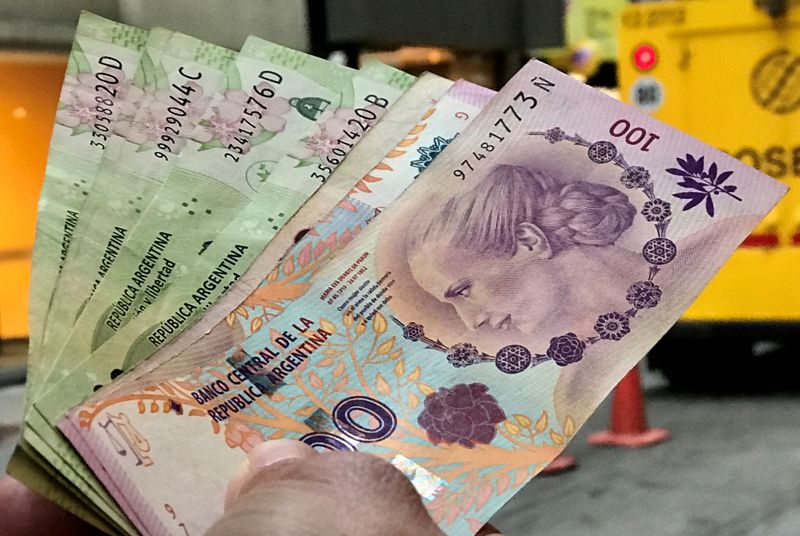By Jorge Otaola, Walter Bianchi and Eliana Raszewski
BUENOS AIRES (Reuters) - Argentine companies are facing an increasingly difficult task to keep up with payments on dollar debt, hiking the risk of a wave of corporate defaults after the country tightened access to foreign currency to stem a sharp decline in reserves.
The central bank move, which pressured firms to restructure their debts and tightened individuals' access to greenbacks, jolted local markets, pummeled bond prices and equities and heightened demand for black market dollars.
The measures mean companies with debt payments greater than $1 million per month between mid-October and the end of March next year can only cover 40% of that in foreign currency, in effect forcing them to refinance the remainder.
"The source of financing is running out. We are talking about companies whose cash flows are local and cannot acquire foreign currency. It is crazy," said Mariano Sardáns, director of Argentine asset manager FDI International.
"This is a death warrant for many firms, or even directly means default for these companies. They run out of financing, they are out of the game."
Moody's in a report said the measures negatively impacted the ability of local firms to pay back debt on time. It said there were $1.253 billion in capital repayments on "negotiable obligations" debt instruments due in the October-March period.
"In this context, we see Argentine companies taking defensive positions, significantly reducing their expansion plans and reviewing their cost structures," the agency said.
Major firms with payments due, according to Moody's, include state energy giant YPF (BA:YPFD), Banco Hipotecario, real estate group IRSA SA (BA:IRSA), agriculture firm Cresud SA (BA:CRES), and renewable firm Genneia SA [EMGSD.UL].
The companies declined to comment. YPF has already restructured part of the debt and does not expect refinancing problems.
"This is a step never taken before, which puts firms in a situation of virtual default beyond the credit risk that they have," said an Argentine executive at an exporting firm facing around $20 million of payments in December.
The executive, who asked not to be named, said his firm would present a tentative restructuring plan to the central bank before Sept. 30.
"This measure where they oblige you to enter a restructuring and do not give you clarity on what happens if there is no success in that restructuring is unprecedented."
Argentina Inc was already facing a tough future. The economy is emerging from a sovereign default and is set to contract around 12% this year, which would mark its third straight year of recession.
The economy plunged a record 19.1% in the second quarter of the year and unemployment has spiked to a 16-year high. Reserves have dwindled, while the additional foreign currency controls have hammered investor confidence.
The rules also led to commercial banks halting sales of dollars to savers as they adapted to the new system. Argentines could already only buy a maximum $200 per month. The central bank has moved to reassure savers over access to dollars.
With the new rules, firms would still have the option of buying dollars in informal markets, but dollars there are around 80% more expensive than the official rate due to high demand.
An official at another Argentine firm facing the issue said he was concerned about how the company's reputation would be affected by forced renegotiations with creditors, despite having the liquidity and the resources to face its debts.
"This continues to generate a lack of confidence in the country," he said.
